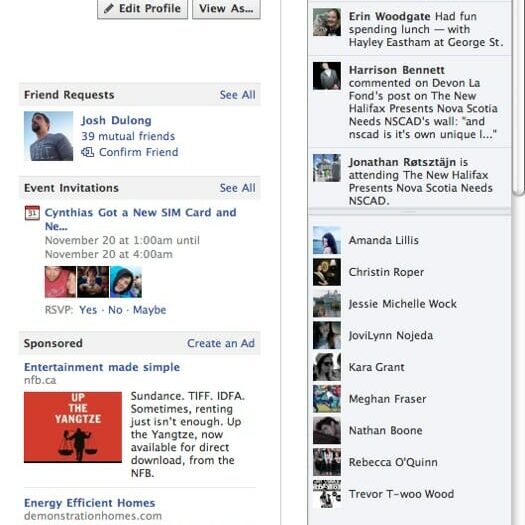
Facebook’s advancements detract from our social experiences

I was filling out a survey the other day that asked me, “How many times a day do you use the Internet?” and I had to stop and reflect on how this was utterly and completely irrelevant in this day and age.
Even for me, someone who doesn’t own a cellphone, let alone a smartphone, I “use” the Internet for the majority of my day. In the 21st century, especially in our particular sample (tech-savvy university students), the majority of our life is lived online and, by default, on Facebook.
Facebook has a monopoly on the Internet. How many websites do you visit now that don’t have a “Like” button, or don’t tie in with your Facebook account? If you pick up a girl or guy in the bar, are you really going to ask them for their phone number and go all archaic on their ass, or are you going to ask them, kindly, to “Facebook” you?
Now, I could launch into a verbose, self-aggrandizing tirade about Facebook right now, but the fact of the matter is, I use it just like everyone else. I am not immune, but Facebook is.
Facebook hasn’t just set the standard for social networking, it is the social network. Facebook is slowly becoming an extension of our identities, as official and binding as a Social Insurance card.
We are obliged to validate our Facebook identities with cellphone numbers. We need to consistently clarify to Mark Zuckerburg and co. that we’re just browsing from a different IP address, and not a hacker. I can’t even change my name on Facebook to anything it deems inappropriate or that I can’t back up with documentation.
It is a constant barrage of social information. Truly a network. With Facebook’s new addition of a real-time “activity window” on the right hand side of your screen, as well as amalgamating the aging style of “messaging” into its perpetually annoying and poorly coded “Chat” function, we’re now subjected to a constantly updated, immovable, sprawling web of information on absolutely everyone we (vaguely) know. There is so much information on Facebook that as soon as I log on, I’m overwhelmed and bored at the same time. Facebook has so much information about my social world that I am completely apathetic to it.
Whenever Facebook introduces any change—no matter how minute—there is an instant backlash of millions of users complaining about how “terrible” or “ugly” or “awkward” the “new Facebook” is. So why not just stop using it? Why put up with half-assed coding and piss-poor web design? Why is it that Facebook can institute poorly written functions and absolutely garish looking pages without any flak at all?
Ubiquity.
Where else are you going to go? Facebook is pervasive, viral and integral.
It is rapidly and efficiently replacing every form of communication. Email and MSN Messenger seem like relics of the past. Within five minutes of meeting someone, we’re trawling for information and informally stalking and forming opinions on a person.
We live on Facebook.
We update our statuses at concerts and message our friends telling them what a great band they (and we) are missing. We refresh our friends’ profiles in class (raising the question of why we’re even in class), and we share pertinent and personal relationship details in terrible grammar and embarrassing abbreviations.
When you stop using Facebook, it’s a statement. People take breaks from “All the Drama” and blame Facebook as if it’s a trashy blonde instituting this gossipy, vindictive drama. No one ever gave up the telephone because of gossip.
It’s not that Facebook creates all this drama and self-indulgence, it’s just that it’s really amazing at facilitating it. It’s become the new standard, so no matter how ugly or obtrusive it becomes, we have to give it precedence. It has become a crutch.
It deadens all face-to-face conversation, and it removes any mystery from dates (“Oh, I already knew that, I saw your post”). It wraps up who we are and what we like in a neat, blue and white package. We do everything faster, more succinctly and with little context. We entrust Facebook to do all the work for us, while we sit back and passively wade through the piles of information.
Now, you can blame Facebook all you want for its cramped, crass pages, questionable information distribution, aggressive copyright collecting and purported underlying right-wing, conservative bias. But when it all comes down to it, you’re using it just like everyone else, who are also using it just like everyone else. You can’t blame Facebook any more than you can chastise the Telegraph. Instead of pointing the finger to a website, we should take a minute and reflect on just how much of our lives we’re letting it dictate.
Giving up Facebook is like saying you’re never drinking again: It’s unrealistic, attention-seeking and soaked in poor decisions and regret. But that doesn’t mean you can’t stop using it like an idiot.






